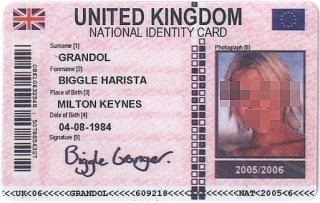
A More Free West Lothian Question?
I was quite excited when
this BBC article popped up on the news reader, detail the UK government's truly abysmal ranking in a report by
Privacy International league table on protection for civil liberties and how much better Scotland, when considered alone, ranks.
I'll have to be honest and say that to an extent I was disappointed when I got round to reading the report in question today, as it did seem to be based on rather subjective criteria, even if it's conclusions are very much in line with other similar studies and commentary from both within and without this country.
On so many issues, from the size of our DNA database, to the number of surveillance cameras, to the scope of the proposed ID card database coupled with it's cousins that are even closer to being a reality for the NHS and the country's children, there is pretty clear tangible evidence that the UK is light years ahead down the track to the complete surveillance society.
As such, any report that spells it out so clearly is to be welcomed, even if it could have punched harder with solid facts and a less arguable methodology behind it, especially from an organisation which is traditionally very sound on both.
Our relative wealth, and commensurate ability to break through technical barriers is rapidly overcoming the head start that certain former more authoritarian regimes had in reversing the roles of citizen and state in the last century. Indeed, amongst the new European democracies covered by the report there is are clear signs that their citizens and possibly even their governments have learned the lessons that our own masters arrogantly think do not apply to them; lessons which a distressingly large, though mercifully dwindling number of 'nothing to hide, nothing to fear' sheep are too stupid to ponder even for a moment as long as it 'keeps the immigrants out'.
The report's findings on Scotland are also interesting and once again they do at least bring some structure to the general impression that they at least care about the aspects of liberty involved in many of these matters, even if in many cases their ability to act is severely constrained by the elements that are reserved to Westminster. It shouldn't be forgotten either that this sentiment is not constrained to the SNP, with the former Labour/Liberal administration already having made a number of hostile noises about the nascent Blair/Brown police state before they were turfed out office.
With all other parties north of the border united against most of Westminster's actions in these areas and the tartan wing of Labour itself hostile it does seem likely that Scotland, for the immediate future, will remain infertile ground for the growth of the NuLab surveillance society.
Perhaps in that there is some limited grounds for hope.
While I use the example I am about to quote with a due sense of dread, and understand that there are many huge differences between the cold-war era and the case in hand, some of the political calculus remains the same.
For all its greater size and supposed economic might, East Germany could never quite overcome the existence of a smaller, at least geographically speaking, more liberal state, more in tune with the instincts of its citizens, sat right on their borders, with a pretty similar culture and an even more similar language.
Many of the wonders proclaimed by the Scottish executive are, as anyone can see, as about as substantial as their own-brand mist. I do though wonder if we in England, might start to look over Hadrian's wall for an understanding of the proper role for the state and its agents, as others once looked over a newer and uglier concrete edifice once did.
Yes, I do go too far, but at least when I listen to MSPs of all parties on the box, they do still seem to understand that there is a balance to be struck, whereas this side of the border one of the major parties, sadly the the badly-governing one, seems to see it is a matter deserving only of lip service.










 RSS Feed - Main Blog
RSS Feed - Main Blog






